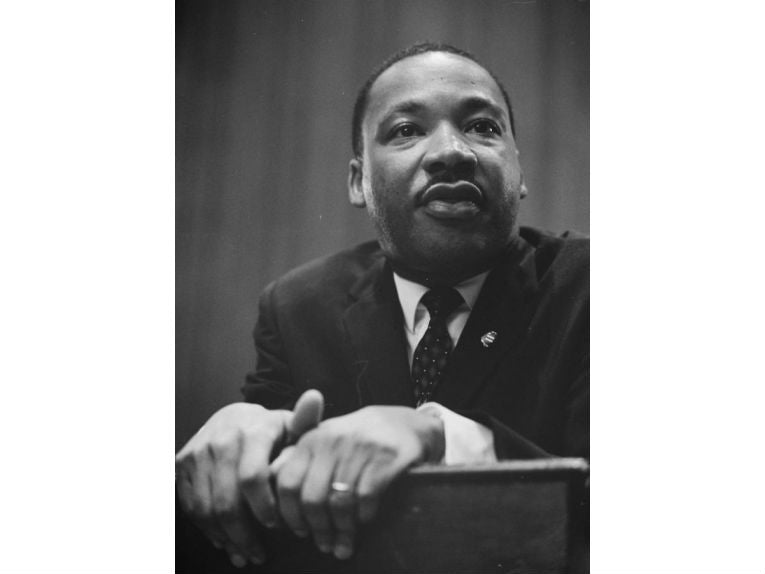Nobody who was born after, say, 1950 will remember Martin Luther King while he was alive, but few people born before that date will ever forget him.
He was born Michael King on 15th January 1929 in the US town of Atlanta, Georgia, where he attended segregated public schools. He graduated from high school at the age of fifteen and four years later received a BA degree from Morehouse College, a distinguished Negro institution in Atlanta.
The next three years were spent studying for a BD at Crozer Theological Seminary in Pennsylvania, where he was elected president of a predominantly white senior class. After winning a fellowship at Crozer, he enrolled in graduate studies at Boston University.
He received his doctorate in 1955, by which time he was a Baptist minister in Montgomery, Alabama.
At this time there was a legacy of strict segregation between black and white people in the Southern United States and King had always been a strong worker for the civil rights of his race. During his time in Montgomery he was already a member of the executive committee of the National Association for the Advancement of Coloured People.
In December 1955 he accepted the leadership of what became known as the Montgomery Bus Boycott. This came about after the arrest of a young black woman for refusing to give up her seat to a white man on a bus. The boycott lasted for 382 days and during that time King was arrested, his house was bombed and he was subjected to much personal abuse.
The outcome was that in December the following year the US Supreme Court ruled that the laws requiring segregation on buses were unconstitutional and that Negroes and whites should ride on the buses as equals. King emerged as a Negro leader of the first rank.
During the following eleven years he travelled over 6 million miles and delivered over 2,500 speeches. He was not just concerned with injustice in his own country, but he appeared wherever there was injustice, protest and action. He was determined to stamp out all forms of segregation and although the mass protests that he led were always peaceful, that did not stop him from being arrested upwards of 20 times.
On 28thAugust 1963 King made what was undoubtedly his most famous speech. In front of a crowd of a quarter of a million, following a peaceful civil rights march in Washington DC, he lamented that the "Negro was still crippled by the manacles of segregation and the chains of discrimination ... I have a dream that one day this nation will rise up and live out the true meaning of its creed: 'We hold these truths to be self-evident: that all men are created equal.'"
In October the following year, at the age of 35 he became the youngest ever recipient of the Nobel Peace Prize. He donated his prize money to the civil rights movement
In April 1968 King went to Memphis, Tennessee, where he was to lead a protest march in sympathy with striking garbage workers. In the evening of 4th April, while standing on his hotel balcony, he was assassinated.
Just days after his assassination, Congress passed the Civil Rights Act of 1968. One of the chief features of this Act was to outlaw discrimination in housing-related issues on the basis of race, religion or national origin.
In 1977 King was posthumously awarded the Presidential Medal of Freedom. Since shortly after his assassination there had been a campaign for a federal holiday in the United States to honour Martin Luther King, but was not until 1983 that Ronald Reagan signed the holiday into law, making it the third Monday of January each year. In 2004 King was posthumously awarded the Congressional Gold Medal.
Martin Luther King was only 39 when he was assassinated, but most of his life had been spent fighting for justice and civil rights for oppressed people. This did not simply extend to people in his own country; his influence was worldwide and had a major effect on the recognition of injustices and the appalling lack of civil rights in many other countries.
His work is credited as being a great inspiration to the Black Consciousness Movement and Civil Rights Movement of South Africa. South African leader Albert Lutuli, another black Nobel Peace laureate, cites King's work as his inspiration.
Not just in the United States, but around the world countless streets have been named in his honour. A small statue of him is even included in the Gallery of 20thCentury Martyrs in London's Westminster Abbey.
Martin Luther King had a talent for provoking action.
"Yes, if you want to say that I was a drum major," he once commented, "say that I was a drum major for justice; say that I was a drum major for peace; I was a drum major for righteousness. All the other shallow things will not matter."
In 2013 Martin Luther King Day will fall on 21stJanuary and will be celebrated and acknowledged, not just in the United States, but in many other countries throughout the world.










